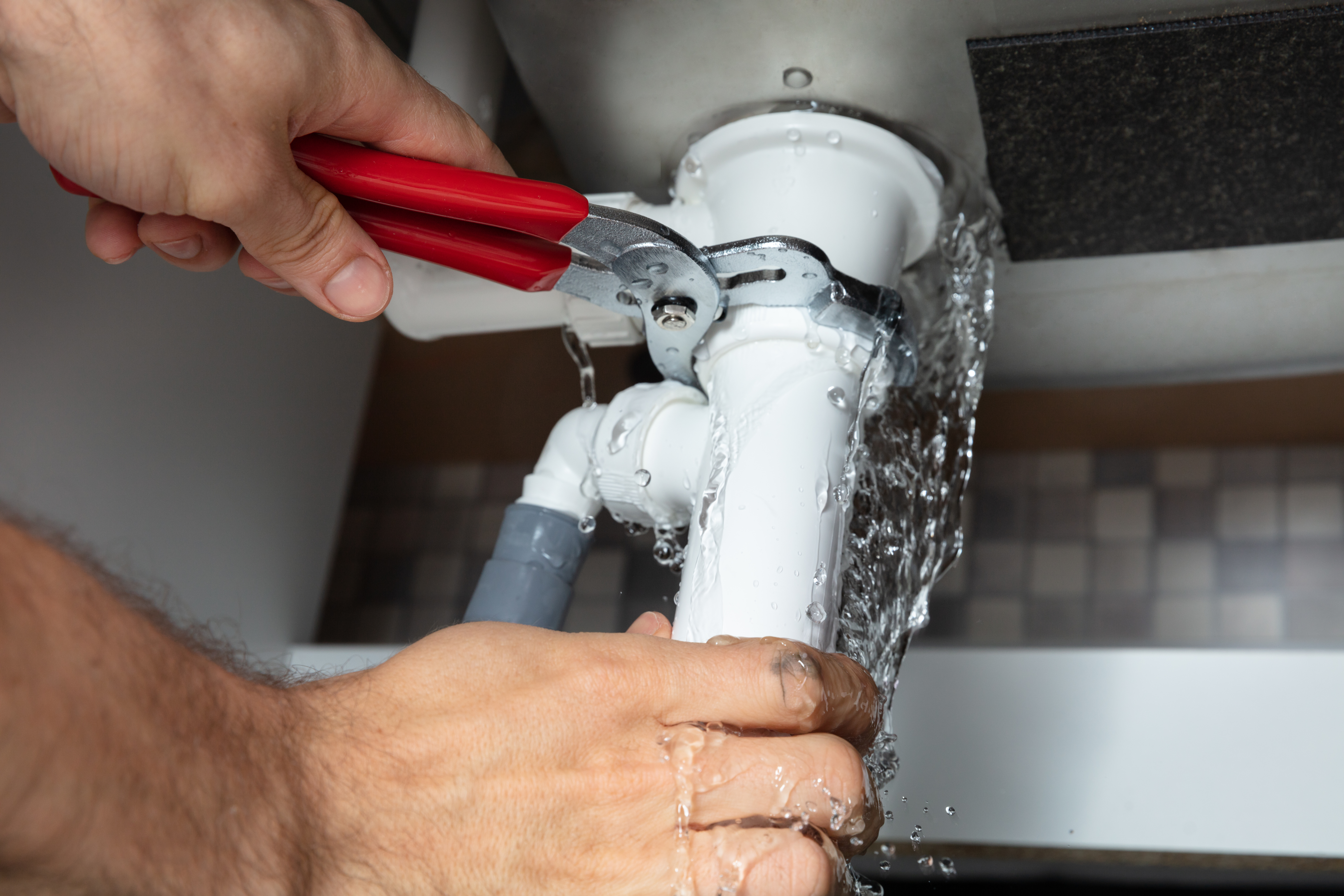Water pressure plays an important role in daily household activities. Your home’s occupants rely on decent water pressure for everything from showering to washing dishes. Poor water pressure can disrupt everyday errands and can also have a detrimental effect on items like household appliances. Even more unsettling, water pressure issues can also indicate major problems with your home plumbing. A look at some of the most common reasons for low water pressure can help you recognize the first signs of trouble and provide insight on when it is time to contact a professional.
What Is Water Pressure?
Water pressure is the force at which water exits faucets. Scientists measure water pressure in pounds per square inch (PSI). The original source of water pressure is altitude or elevation. Municipal water distribution systems designate water holding tanks in areas with higher elevation than homes that will receive water. Gravity then increases the water pressure. Some towns and cities also use pumps or pressure stations to help bring water pressure to an acceptable level before it reaches homes. Across the country, residential water pressure can range from 30 to 80 PSI.
According to the U.S. Office of Energy Efficiency and Renewable Energy, the ideal range for water pressure is 40 to 60 PSI. In fact, most building codes have a minimum water pressure of 35 PSI. The ideal water pressure of 40 to 80 PSI can help home occupants accomplish most daily tasks without disruption. Water pressure that falls beneath 40 PSI is called low water pressure, and water pressure that measures below 30 PSI is considered extremely low. When the pressure is too low, household fixtures and appliances may not work correctly.
For example, household appliances like dishwashers may not receive enough water to rinse or complete cycles efficiently. This can leave an unpleasant residue on dishes and cutlery. Similarly, washing machines may not have enough water to function properly, resulting in a soapy residue that prematurely wears down clothes and irritates skin. When water pressure is low, kitchen faucets may take longer to fill pots or cups, and shower fixtures or bathtub faucets may not work sufficiently.
Low water pressure can even affect your toilet’s ability to flush or impact the amount of water that leaves your gardening hose. Rather than flushing your toilet multiple times or letting your sprinklers run indefinitely, it is better to determine the reasons for low water pressure. Ignoring low water pressure can allow underlying plumbing problems to go undetected, eventually leading to emergencies and costly repairs.
What Are the Reasons for Low Water Pressure?
There are a number of plumbing issues that can cause low water pressure. Problems that impact water pressure can range in severity and include clogged pipes, leaking pipes, closed valves, or damaged water lines. If you suspect one of the following issues, a professional plumber can identify the exact cause and devise a plan to tackle the problem.
Debris in Pipes
Clogged pipes can easily interfere with home water pressure. Debris like dirt, sand, and rust can begin to clog pipes over time. Mineral deposits from hard water can also accumulate in the pipeline. After hardening, this scale buildup can reduce or restrict water pressure. The occurrence of clogs can also vary based on the materials used for piping. For example, galvanized steel pipes installed in homes built before 1960 are more likely to have clogs. While clogs can occur anywhere in the pipeline, you may first notice clogs due to low water pressure in showerheads or faucets. A professional plumber can identify the source of the clog and use expert techniques such as drain snaking or hydro-jetting to remove this problem from your system.
Corroded Water Lines
Corrosion is the result of oxidation. Scientifically, corrosion occurs when the atoms of pure metals react with water or air to produce metal oxide. These metal oxides are structurally undesirable because they can eventually become brittle and crack. Like mineral scaling, corrosion is common in older galvanized steel pipes. In the past, galvanized steel was the best alternative to dangerous lead piping. However, pure steel slowly corrodes over time due to water exposure. This corrosion creates an unpleasant buildup and reduces water pressure. As the corrosion deepens, it can compromise structural stability and cause holes, cracks, or leaks. A plumber can fix leaks and even address rust with tools like high-pressure hoses, but you may need to replace old or corroded pipes with modern materials to protect the structural integrity of your home.
Leaking Pipes
Plumbing leaks divert water away from the appropriate pipes and fixtures. This can lower water pressure. Common places for leaks include areas near the water heater or valves beneath sinks. Serious leaks can also occur in piping behind walls. Leaks that are the result of frozen or corroded pipes can escalate into a plumbing emergency. While large leaks are easy to see in the home, smaller leaks that cause the intermittent use of water often go unnoticed. If you notice unexplained changes in your water meter or water bill, you may have a leak in the home. It is important to contact a plumbing company once you suspect a leak so that a professional can correct the issue.
Failing Pressure Regulator
Another possible cause of low water pressure is a defective pressure regulator. Also known as the pressure-reducing value, this regulator is a specialized device that ensures the force of water input and output will not damage your pipes. When this valve is faulty, however, your household can experience a sudden drop in water pressure. This valve failure often impacts all fixtures within the home. Since correcting the pressure regulator is not an easy fix, your best bet is to contact a licensed plumber. This trained professional can determine whether repair or replacement is the best option for restoring water pressure in the home.
Partially Closed Shutoff Valve
The shutoff valve controls the entry of water into the home. It is often located at the juncture where the main supply line reaches the residence. Full water pressure can only occur when this valve is fully opened. If there is any type of obstruction blocking this valve, your household can experience water pressure problems. Contact a plumber if you suspect a severe blockage or damaged valve.
Partially Closed Meter Valve
Some homes also include a water meter valve. Depending on municipal installation laws, the water meter valve can be located either near the main shutoff valve or housed in a utility box outdoors. In various jurisdictions, the meter valve can even sit underground. Sometimes the meter valve can remain accidentally knocked open after major construction projects or other work on the home. Contact a professional to correct meter valve issues and restore the appropriate water pressure in your house.
Water Supplier Issues
Municipal supplier issues can also cause low water pressure. These municipal water issues are often the result of problems with the water main. A water main is the leading underground pipe within a municipal water distribution system. Much like the aqueducts in ancient Rome, the water main pipe is the primary artery that provides water to smaller pipes for houses and businesses. However, fractures in the water main can cause the accumulation of pollutants and unwanted debris. This buildup eventually blocks smaller pipes and creates low water pressure.
Faulty Fixtures
Low water pressure in all household fixtures can be the result of a failing pressure regulator or problems in the supply line. But if low water pressure occurs in only one or two fixtures, it is more likely a localized problem that an expert can quickly diagnose and fix. For example, your fixture may have an aerator clog, or the fixture itself may be outdated and require replacement. A professional can correct fixture issues before they result in leaks or other problems.
Get Help From the Pros
Water pressure has an impact on everyday quality of life within your household. While low water pressure is a hassle, you do not need to live with it indefinitely. At Bumble Breeze, we provide help with water pressure issues for all households in Las Vegas and the surrounding areas. Our licensed plumbers can inspect sinks, showers, and water heaters to ensure that your home water system runs smoothly. We offer a wide range of plumbing services, including leak detection, faucet installation, hydro-jetting, and pipe repair. Contact us at Bumble Breeze today for any of your plumbing needs.


